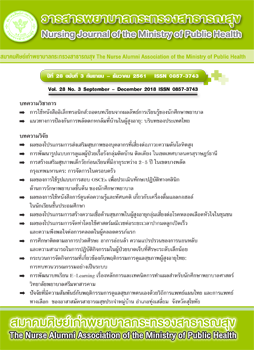The Effect of the Objective Structured Clinical Examinations (OSCEs) Test to Clinical Skill Practices in Basic Medical Care of Nursing Students
Main Article Content
Abstract
The purpose of the descriptive study was to examine the effect of the Objective Structured Clinical Examinations (OSCEs) to clinical skill test in Basic Medical Care (BMC). The total of 119 undergraduate students from senior nursing student at Faculty of Nursing, Saint Louis College Academic year 2017 were recruited by a purposive sampling technique. The OSCEs included three components 1) Clinical scenarios (8 sets), 2) checklist form and criteria recorded score for clinical skills and 3) satisfaction for the OSCEs. Data were analyzed using descriptive statistics. Eight sets of the OSCEs clinical scenario were implemented to test clinical skills of BMC in nursing students. The result revealed that the OSCEs could evaluate and examine the different of each clinical skill in BMC. The majority of nursing students passed the OSCEs test (96.7%). Most of them had the skill of history illness assessment (92.4%). 70.6 % of them had a low score in the skill of problem lists and differential diagnosis. The majority of senior nursing students had a total score of the OSCEs at the excellent level (68.1%). Three percent of them had a poor level. The satisfaction score in total had a highest level (X=4.66, SD=.51) Findings provide evidence of the applicability of the eights OSCEs BMC to inform the development and delivery of simulation activities for nursing students. The OSCEs BMC could evaluate the difference of an individual clinical skills as well as improve nurse students’ skills.
Article Details
บทความและรายงานวิจัยในวารสารพยาบาลกระทรวงสาธารณสุข เป็นความคิดเห็นของ ผู้เขียน มิใช่ของคณะผู้จัดทำ และมิใช่ความรับผิดชอบของสมาคมศิษย์เก่าพยาบาลกระทรวงสาธารณสุข ซึ่งสามารถนำไปอ้างอิงได้
References
2. Kanhagilok S, Punsumreung T. Simulation based learning: design for nursing education. Journal of Nursing and Education 2016;9(1):1-14.(in Thai)
3. Klangsin S, Suwanrath C, Khanuengkitkong S. The Comparision of skills in the objective structured clinical examination scores of 6th year medical students in department of bbstetrics and gynecology. Songklanagarind Medical Journal 2016;34(6):331-8.(in Thai)
4. Jermworapipat S, Sirisupluxana P, Paiboontananon J, Dhabdhimsri V, Kemkhan P. The effects of objective structured clinical examinations (OSCEs) assessment for the clinical skills and satisfaction of adult and elderly nursing comprehensive practice achievement test in junior nursing students Boromarajonani College of Nursing Bangkok. Journal of Boromarajonani College of Nursing, Bangkok 2017;33(3):91-100.(in Thai)
5. Saitanu K, Thanee S, Chumuang K, Luprasong S. Object structured clinical examinations (OSCE) for assessment therapeutic relationship competency of nurse students, Faculty of Nursing, Ubon Ratchathani University. The 1st Abstract Conference (RTUNC 2016); 2016 Jul 29; Ubonratchathani, Thailand. 2016. 2204-14. (in Thai)
6. Lohapaiboonkul N, Palakarn B. The Effects of an objective structured clinical examinations (OSCEs) Test to evaluate the knowledge and clinical skills in basic medical treatment and perceive of preceptors from community of the clinical skills of nursing students. Nursing Journal of the Ministry of Public Health 2013:24-34. (in Thai)
7. Sriruksa K. Assessment Clinical skill by objective structured clinical examinations (OSCE). Khon Kaen Journal 2011.
8. Faculty of Nursing, Saint Louis College. Thai Qualifications Framework for Higher Education 3 (102426 Basic Medical Care). Bangkok: Faculty of Nursing, Saint Louis College; 2012. (in Thai)
9. Srisathinarakul B. The Methodology in Nursing Research. 5th edition. Bangkok: You and I intermedia; 2010.
10. Ekthamasuth C, Taweesuk P, Choijjoho R. The development of objective structured clinical examinations instrument in maternal and newborn Nursing and Midwifery Practicum II. Journal of Boromarajonani College of Nursing, Bangkok 2017;33(3):27-37. (in Thai)
11. Sroiwong P, Lasukha D, Chaiang J, Kumponsiri T, Pholthikul R, Khaithi wathanaja- reian S. Develop and explore the feasibility of the evaluation model for medical nursing comprehensive practice using objective structured clinical examinations (OSCE). Thai Journal of Nursing Council 2014;29(4):79-90.(in Thai)
12. Brannick MT, Erol-Korkmaz HT, Prewett M. A systematic review of the reliability of objective structured clinical examination scores. Medical Education 2011;(45):1181-9.
13. Tongmeekwan S, Saetong S, Jantaweemuang W. Implementing the objective structured clinical examinations (OSCE) to evaluate clinical skills in basic medical treatment of nursing students. Journal of Boromarajonani College of Nursing, Songkha the Ministry of Public Health; 2014. (in Thai)
14. Harden RM. What is an OSCEs?. Medical Teacher 1988;10(1):9-22.

